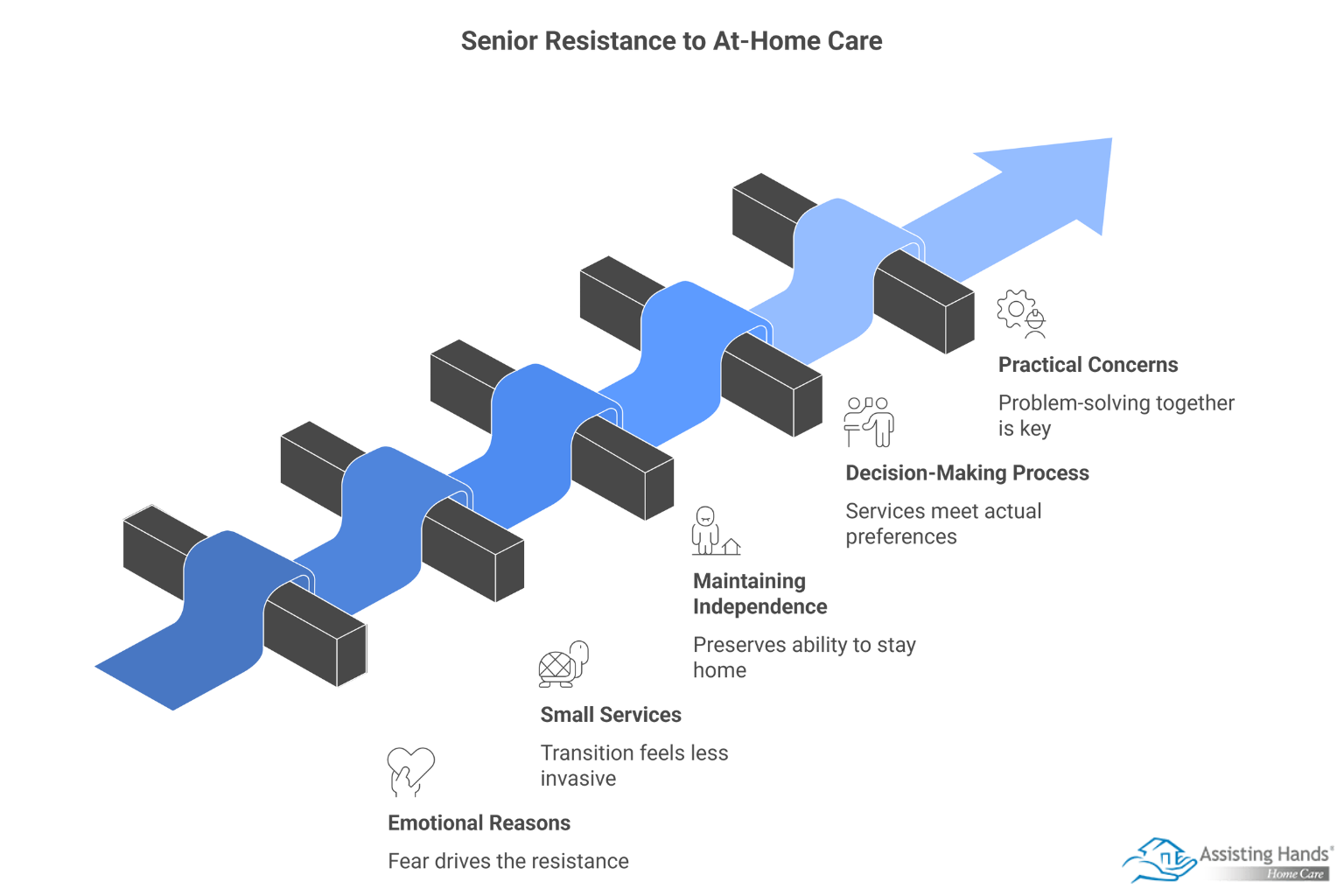
Table of Content
When aging family members resist accepting home care services, the situation can feel emotionally charged and practically challenging. Understanding the root causes of this resistance and approaching conversations with empathy can help you navigate these difficult discussions while ensuring your loved one receives necessary support.
Understand the Emotional Reasons behind Resistance
Your aging loved one’s opposition to home care often stems from deep-seated fears rather than simple stubbornness. Loss of independence represents one of the greatest concerns for seniors, since accepting help can feel like admitting they’re no longer capable of managing their own lives.
Common emotional triggers include:
- Fear of losing control over daily routines and environment
- Worry about the financial burden on family members
- Embarrassment about needing assistance with personal tasks
- Anxiety about strangers entering private spaces
- Grief over the loss of former capabilities
Recognizing these underlying emotions helps you approach conversations with greater compassion and develop solutions that address your loved one’s specific concerns rather than dismissing his or her feelings.

Start with Small, Nonthreatening Services
Rather than suggesting comprehensive care immediately, introduce home services gradually to help your loved one adjust to the concept. Beginning with less personal tasks makes the transition feel more manageable and less invasive.
Consider starting with services such as:
- Housekeeping or light cleaning assistance
- Grocery shopping and meal preparation
- Transportation to medical appointments
- Yard work or home maintenance tasks
- Companionship visits for social interaction
Once your loved one experiences positive interactions with care providers and realizes his or her independence isn’t completely compromised, he or she may become more open to additional services as care needs increase.
Home care experts are available to provide high-quality care to seniors on an as-needed basis. From assistance with mobility and exercise to providing transportation to the doctor’s office and social events, there are a variety of ways professional caregivers can help your aging loved one continue to live independently.
Frame Home Care as Maintaining Independence
Reposition the conversation to emphasize how home care actually supports the desire to remain independent. Help your loved one understand that accepting assistance now can prevent more serious incidents that might force him or her into institutional care.
Present home care benefits by highlighting:
- How meal preparation services can help your loved one continue living at home
- Ways transportation assistance keeps your loved one connected to the community
- How personal care support reduces fall risks and hospitalizations
- The peace of mind that comes from having help available when needed
This approach transforms home care from something that takes away autonomy into a tool that preserves the ability to stay in familiar surroundings.
Living independently is important for seniors who want to maintain a high quality of life. For some, this simply means receiving help with tasks that have become more challenging to manage over time. Even when families have the best intentions, they may not have the time to provide the care their elderly loved ones need and deserve. If your loved one needs help for a few hours a day or a few days a week, reach out to Assisting Hands Home Care, a trusted provider of respite care Fremont seniors can depend on.
Involve Them in the Decision-Making Process
Giving your loved one control over care decisions reduces resistance while ensuring services meet his or her actual preferences. When people feel heard and respected, they’re more likely to cooperate with necessary changes.
Include your loved one by:
- Allowing him or her to interview potential caregivers
- Letting him or her set schedules that work with his or her routines
- Asking for input on which services he or she needs most
- Respecting his or her preferences about gender, age, or personality traits of caregivers
- Starting with trial periods so he or she doesn’t feel trapped by permanent decisions
This collaborative approach demonstrates that you value your loved one’s opinions and aren’t trying to take over his or her life completely.
Address Practical Concerns Directly
Sometimes resistance stems from legitimate logistical worries that can be resolved through careful planning and clear communication. Taking time to address these practical issues shows respect for your loved one’s concerns while problem-solving together.
Common practical concerns include:
- Cost and insurance coverage for various services
- Background checks and reliability of care providers
- What happens if your loved one doesn’t get along with assigned caregivers
- How to maintain privacy while receiving personal care
- Emergency procedures and communication with family members
Providing detailed information about these topics, along with written materials your loved one can review privately, helps him or her make informed decisions rather than rejecting services based on incomplete information.
When resistance continues despite your best efforts, remember building trust takes time. Some aging adults need multiple conversations over weeks or months before they feel comfortable accepting help. Consider involving your loved one’s doctor, spiritual advisor, or trusted friends who might reinforce the benefits of home care from different perspectives.
Stay patient and persistent while respecting your loved one’s timeline for accepting change. Professional geriatric care managers can also provide objective guidance when family dynamics make these conversations particularly challenging.
Hiring a compassionate professional in-home caregiver is one of the best ways to ensure your loved one enjoys a high quality of life. Seniors can face a variety of challenges as they age, many of which can be mitigated with the help of professional in-home caregivers who provide high-quality in-home care. Fremont families trust Assisting Hands Home Care to help their elderly loved ones age in place safely and comfortably. Call today to speak with a friendly and experienced Care Manager to formulate a home care plan for your loved one.








